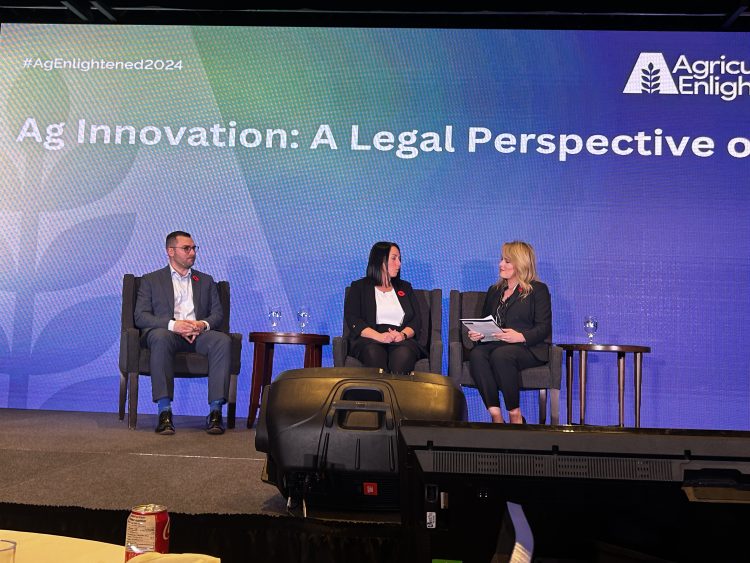Charting a sovereign future: What the Innovation and Prosperity Report means for Manitoba

Today, the Government of Manitoba released its Innovation and Prosperity Report, prepared by the Innovation and Productivity Task Force. The task force, chaired by entrepreneur Jim Balsillie, lays out a bold economic vision in the report, one that treats intellectual property (IP), data and artificial intelligence (AI) as key sources of wealth and sovereignty for Manitoba. Rather than competing with low costs or raw production, the report argues, Manitoba’s future prosperity will depend on owning and governing its intangible assets, the ideas, algorithms and data that increasingly define the global economy.
Why it matters
Premier Wab Kinew and Minister of Innovation and New Technology Mike Moroz have endorsed the report as a blueprint for a “sovereign, value-added economy” that ensures Manitobans capture the benefits of technological progress.
The Innovation and Prosperity Report envisions Manitoba repositioning itself as a leader in today’s knowledge-based economy and aims to provide a framework for driving competitiveness, innovation and inclusive prosperity by taking a path that aligns economic goals with strategic priorities of a sovereign, valued-added economy. As Premier Kinew put it, “Manitoba is ready to punch above its weight in the new AI frontier.”
From resource economy to knowledge economy
The report warns that Canada’s economic stagnation is rooted in missing the shift from physical production to an intangible economy where power flows from controlling IP, data and AI systems. Jurisdictions that own these assets set the terms of trade, while others pay for access. Manitoba, the Task Force argues, can reverse this dynamic by embedding sovereignty and ownership into every layer of its innovation strategy.
For companies, that means prosperity will no longer come simply from operating efficiently but from owning the code, IP and datasets that drive their industries.
The report based its recommendations on six strategic pillars, which each discussed in greater detail below:
1. Intellectual property
The report identifies IP not just as a legal tool but as economic infrastructure and urges Manitoba business to move from “basic awareness” to strategic IP literacy. That is, understanding what assets they own, how to protect them and how to use them to attract capital and negotiate from strength.
Report recommendations include:
- Building a provincial IP ecosystem, including legal clinics and tiered proficiency programs, to democratize access to IP expertise
- Delivering adaptive IP funding supports, tied to business goals and maturity
- Increasing partnerships with post-secondary institutions
- Building IP capacity and proficiency levels, including through legal clinics, to democratize access to IP expertise in Manitoba
2. Data and AI: The rise of digital sovereignty
The report also calls for sovereign control of data, AI and computer infrastructure, arguing that data should be considered a form of capital and jurisdictions that govern data and AI responsibly will attract investment and talent.
Report recommendations include:
- Establishing robust protections to keep Manitoba’s data and citizens secure
- Investing in building sovereign computer and digital
- Building public trust through proactive governance and transparent reporting
3. Infrastructure
According to the report, Manitoba’s infrastructure ambitions, from green energy corridors to broadband expansion, are tied directly to its innovation agenda. Equally, it states, the government’s Nation-to-Nation approach emphasizes that Indigenous partnership and equity participation are prerequisites for major projects.
Report recommendations include:
- Embedding fibre networks alongside clean-energy transmission lines to strengthen both physical and digital sovereignty
- Implementing and expanding plans for large-scale, long-term infrastructure projects
- Incorporating the report’s sovereignty-focused, value-added recommendations into major infrastructure projects
- Treating Indigenous consultation and benefit-sharing agreements as foundational, not optional
4. Skills and human capital
The report identifies a structural challenge: Technological transformation is outpacing workforce adaptation. To address these issues, the report argues, Manitoba should emphasize aligning education, training and industry to unlock even greater provincial potential.
Report recommendations include:
- Generating a reporting process drawing input from industry, post-secondary institutions, Indigenous communities and labour organizations to build evidence-based policy responses
- Ensuring that Manitoba’s workforce priorities are fully integrated into national strategies
5. Federal-provincial alignment
Because many levers of IP, data and AI policy remain federal, the report argues, Manitoba’s strategy depends on alignment between provincial and federal legislation and regulations, as well as policies, programs and investment.
Report recommendations include:
- Advocating for federal modernization of economic strategies and policy frameworks
- Establishing a structured, annual federal-provincial summit, led by Manitoba, that convenes leaders, ministers and business stakeholders to, among other things, coordinate on policies and set strategy
6. Sector considerations
The report calls for the creation of a continuous feedback loop between firms and policymakers to keep critical conversations active, ensuring both government and industry remain aligned on their common goal to drive prosperity.
Report recommendations include:
- Establishing a public-private process to address the real-time needs of Manitoba’s innovation ecosystem
- Developing an ongoing consultation mechanism to support regular and structured dialogue between government and business
- Engaging directly on key enables of economic development to ensure government programs and policies remain responsive, targeted and grounded
The recommendations laid out in the Innovation and Prosperity Report are bold and sweeping, with the potential to impact every business in Manitoba. If you have any questions about the report, the MLT Aikins technology, intellectual property and privacy group has extensive experience assisting businesses in navigating the adoption of technology and AI and commercialization of intellectual property.
If you would like to discuss how today’s announcement might impact your business, feel free to contact authors Nicolas Joubert or Danielle Graff for assistance.
Note: This article is of a general nature only and is not exhaustive of all possible legal rights or remedies. In addition, laws may change over time and should be interpreted only in the context of particular circumstances such that these materials are not intended to be relied upon or taken as legal advice or opinion. Readers should consult a legal professional for specific advice in any particular situation.




